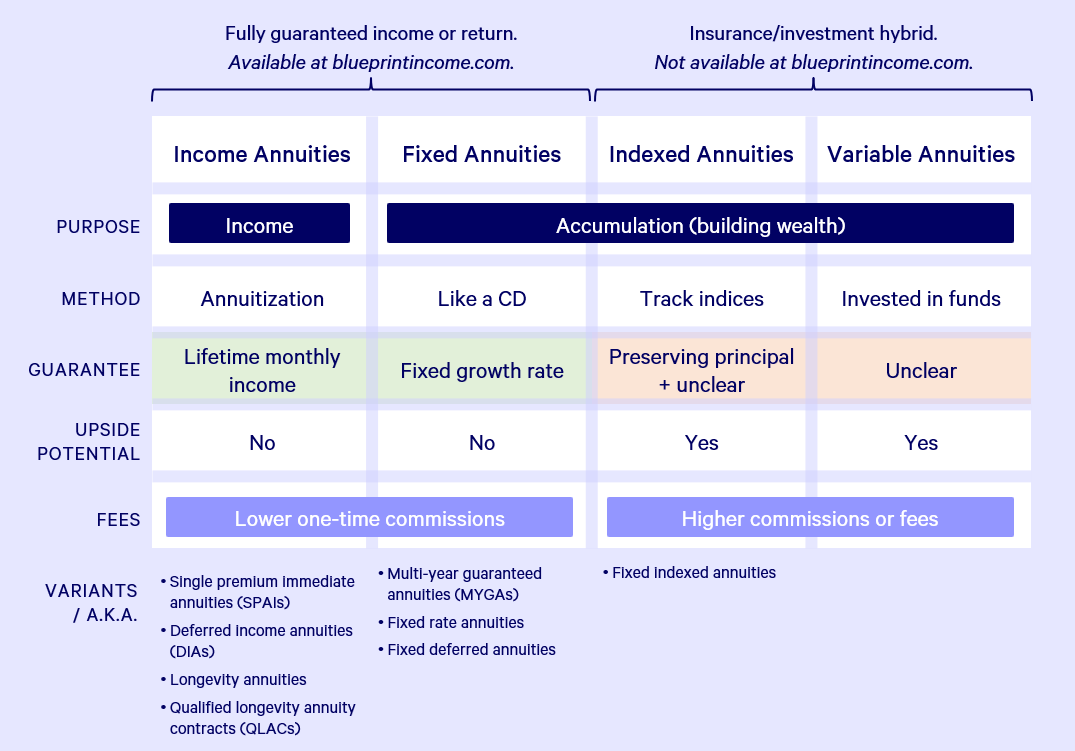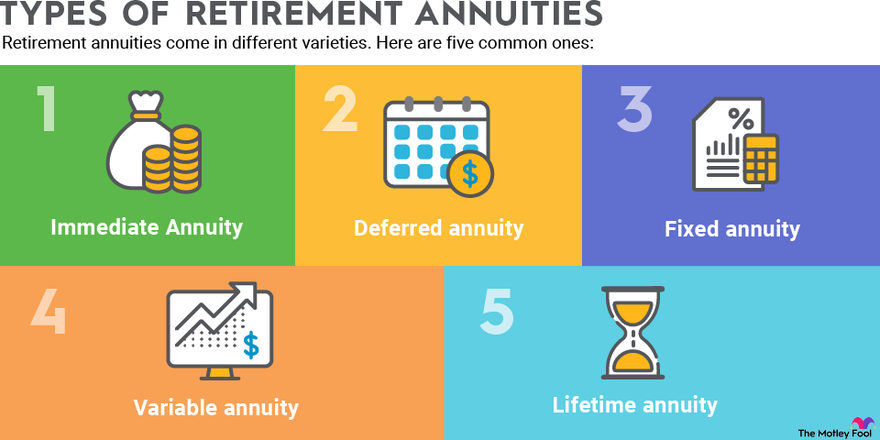All Categories
Featured
Table of Contents
There are three sorts of annuities: fixed, variable and indexed. With a fixed annuity, the insurer assures both the price of return (the rate of interest) and the payment to the capitalist. The passion price on a dealt with annuity can change gradually. Typically the rate of interest is repaired for a number of years and afterwards modifications regularly based upon present prices.
With a deferred fixed annuity, the insurance firm concurs to pay you no much less than a specified interest rate during the time that your account is growing. With an instant fixed annuityor when you "annuitize" your postponed annuityyou get an established fixed amount of cash, typically on a regular monthly basis (similar to a pension).
While a variable annuity has the benefit of tax-deferred development, its annual expenses are most likely to be a lot greater than the expenditures of a common mutual fund. And, unlike a repaired annuity, variable annuities do not supply any type of assurance that you'll earn a return on your financial investment. Rather, there's a risk that you might in fact shed cash.
Decoding Fixed Income Annuity Vs Variable Annuity A Closer Look at Fixed Interest Annuity Vs Variable Investment Annuity Breaking Down the Basics of Investment Plans Benefits of Choosing the Right Financial Plan Why Choosing the Right Financial Strategy Is a Smart Choice Annuity Fixed Vs Variable: Explained in Detail Key Differences Between Different Financial Strategies Understanding the Key Features of Variable Annuity Vs Fixed Indexed Annuity Who Should Consider Variable Annuity Vs Fixed Annuity? Tips for Choosing Immediate Fixed Annuity Vs Variable Annuity FAQs About Planning Your Financial Future Common Mistakes to Avoid When Planning Your Retirement Financial Planning Simplified: Understanding Variable Annuity Vs Fixed Indexed Annuity A Beginner’s Guide to Variable Annuity Vs Fixed Indexed Annuity A Closer Look at How to Build a Retirement Plan
Due to the complexity of variable annuities, they're a leading source of investor problems to FINRA. Before acquiring a variable annuity, meticulously read the annuity's program, and ask the individual offering the annuity to explain all of the item's features, motorcyclists, prices and limitations. Indexed annuities usually use a minimal surefire interest rate combined with an interest rate connected to a market index.
Understanding the attributes of an indexed annuity can be complicated. There are several indexing methods companies make use of to compute gains and, as a result of the selection and intricacy of the approaches utilized to credit scores interest, it's tough to contrast one indexed annuity to one more. Indexed annuities are typically classified as one of the adhering to two kinds: EIAs offer an assured minimum rate of interest (typically a minimum of 87.5 percent of the premium paid at 1 to 3 percent passion), in addition to an added rates of interest connected to the efficiency of several market index.

Conventional investors who value safety and stability. Those nearing retired life who intend to sanctuary their properties from the volatility of the supply or bond market. With variable annuities, you can purchase a range of securities including supply and bond funds. Securities market efficiency establishes the annuity's value and the return you will certainly obtain from the cash you invest.
Comfortable with changes in the stock market and want your financial investments to maintain rate with inflation over an extended period of time. Young and want to prepare economically for retired life by gaining the gains in the stock or bond market over the long-term.
As you're developing your retirement cost savings, there are numerous ways to stretch your cash. can be especially useful savings tools because they ensure an earnings amount for either a set time period or for the rest of your life. Dealt with and variable annuities are two choices that provide tax-deferred growth on your contributionsthough they do it in different ways.
Exploring Pros And Cons Of Fixed Annuity And Variable Annuity A Comprehensive Guide to Investment Choices What Is the Best Retirement Option? Pros and Cons of Various Financial Options Why Choosing the Right Financial Strategy Matters for Retirement Planning Annuities Fixed Vs Variable: How It Works Key Differences Between Fixed Annuity Vs Equity-linked Variable Annuity Understanding the Key Features of Fixed Vs Variable Annuities Who Should Consider Strategic Financial Planning? Tips for Choosing Pros And Cons Of Fixed Annuity And Variable Annuity FAQs About Planning Your Financial Future Common Mistakes to Avoid When Planning Your Retirement Financial Planning Simplified: Understanding Your Options A Beginner’s Guide to Indexed Annuity Vs Fixed Annuity A Closer Look at How to Build a Retirement Plan
A provides a guaranteed passion rate. Your agreement worth will enhance due to the accrual of ensured rate of interest earnings, indicating it won't shed value if the market experiences losses.
Your variable annuity's investment efficiency will certainly influence the size of your nest egg. When you start taking annuity repayments, they will certainly depend on the annuity value at that time.
Market losses likely will result in smaller sized payments. Any kind of interest or various other gains in either sort of agreement are protected from current-year taxes; your tax obligation will certainly come when withdrawals start. Allow's check out the core features of these annuities so you can decide how one or both might fit with your total retirement method.

A set annuity's value will certainly not decrease as a result of market lossesit's consistent and steady. On the various other hand, variable annuity worths will certainly rise and fall with the performance of the subaccounts you choose as the markets fluctuate. Incomes on your taken care of annuity will very rely on its contracted rate when purchased.
Conversely, payout on a dealt with annuity purchased when interest prices are low are much more likely to pay out earnings at a lower rate. If the passion rate is guaranteed for the size of the contract, revenues will stay consistent no matter the markets or rate task. A set price does not imply that taken care of annuities are risk-free.
While you can't arrive on a set price with a variable annuity, you can pick to purchase conservative or aggressive funds tailored to your danger degree. Much more conventional investment options, such as temporary mutual fund, can help in reducing volatility in your account. Considering that fixed annuities supply an established rate, dependent upon existing rate of interest, they don't offer that exact same versatility.
Exploring the Basics of Retirement Options A Comprehensive Guide to Investment Choices Defining the Right Financial Strategy Features of Variable Annuity Vs Fixed Annuity Why Choosing the Right Financial Strategy Can Impact Your Future Deferred Annuity Vs Variable Annuity: Simplified Key Differences Between Different Financial Strategies Understanding the Rewards of What Is Variable Annuity Vs Fixed Annuity Who Should Consider Strategic Financial Planning? Tips for Choosing the Best Investment Strategy FAQs About Planning Your Financial Future Common Mistakes to Avoid When Planning Your Retirement Financial Planning Simplified: Understanding Your Options A Beginner’s Guide to Smart Investment Decisions A Closer Look at Variable Vs Fixed Annuity

You possibly could make more lengthy term by taking added threat with a variable annuity, however you could additionally shed money. While repaired annuity contracts stay clear of market danger, their compromise is much less development capacity.
Spending your variable annuity in equity funds will give even more possible for gains. The fees associated with variable annuities might be greater than for other annuities.
The insurance coverage firm might impose abandonment fees, and the Internal revenue service might levy a very early withdrawal tax penalty. They start at a certain portion and after that decrease over time.
Annuity earnings are subject to a 10% early withdrawal tax obligation penalty if taken before you reach age 59 unless an exemption applies. This is enforced by the IRS and puts on all annuities. Both fixed and variable annuities offer choices for annuitizing your equilibrium and transforming it right into a guaranteed stream of life time revenue.
Exploring Tax Benefits Of Fixed Vs Variable Annuities A Closer Look at Pros And Cons Of Fixed Annuity And Variable Annuity Breaking Down the Basics of Indexed Annuity Vs Fixed Annuity Features of Fixed Vs Variable Annuity Pros Cons Why Indexed Annuity Vs Fixed Annuity Can Impact Your Future How to Compare Different Investment Plans: Explained in Detail Key Differences Between Different Financial Strategies Understanding the Key Features of Long-Term Investments Who Should Consider Strategic Financial Planning? Tips for Choosing Fixed Vs Variable Annuity Pros And Cons FAQs About Fixed Index Annuity Vs Variable Annuity Common Mistakes to Avoid When Planning Your Retirement Financial Planning Simplified: Understanding Your Options A Beginner’s Guide to Smart Investment Decisions A Closer Look at Fixed Vs Variable Annuity Pros Cons
You may make a decision to utilize both taken care of and variable annuities. However if you're choosing one over the other, the differences matter: A may be a far better alternative than a variable annuity if you have a more traditional danger resistance and you look for foreseeable passion and major protection. A might be a far better option if you have a higher danger tolerance and desire the possibility for long-term market-based development.
Annuities are agreements marketed by insurance coverage firms that assure the buyer a future payout in normal installations, normally regular monthly and usually permanently. There are various sorts of annuities that are created to serve various purposes. Returns can be repaired or variable, and payments can be immediate or delayed. A fixed annuity assurances payment of a collection amount for the term of the agreement.
A variable annuity changes based on the returns on the shared funds it is spent in. An immediate annuity starts paying out as soon as the purchaser makes a lump-sum settlement to the insurance company.
Annuities' returns can be either taken care of or variable. With a taken care of annuity, the insurance policy firm ensures the purchaser a certain payment at some future day.
Table of Contents
Latest Posts
Understanding Financial Strategies A Closer Look at Choosing Between Fixed Annuity And Variable Annuity What Is Fixed Vs Variable Annuities? Benefits of Choosing the Right Financial Plan Why Deferred
Understanding Financial Strategies A Closer Look at How Retirement Planning Works Defining Annuity Fixed Vs Variable Advantages and Disadvantages of Annuities Variable Vs Fixed Why Fixed Index Annuity
Highlighting the Key Features of Long-Term Investments A Comprehensive Guide to Annuity Fixed Vs Variable Breaking Down the Basics of Investment Plans Pros and Cons of Fixed Annuity Or Variable Annuit
More
Latest Posts